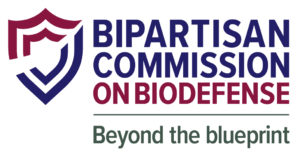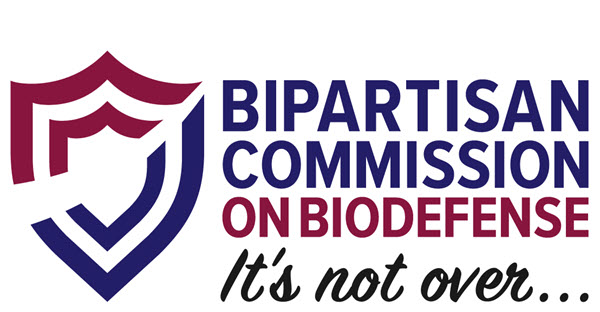Commission Urges Congress to Strengthen Biodefense of Critical Infrastructure and Reduce Risks to the Nation

FOR IMMEDIATE RELEASE
Contact: Steve Aaron
SRA Communications
(717) 554-8614
steve@SRACommunications.com
COMMISSION URGES CONGRESS TO STRENGTHEN BIODEFENSE OF CRITICAL INFRASTRUCTURE AND REDUCE RISK TO THE NATION
WASHINGTON, D.C. (July 7, 2021) – As the Biden Administration and Congress negotiate details on a federal infrastructure package, the Bipartisan Commission on Biodefense urges Congress to reduce national biological risk by taking action to defend against, and eliminate vulnerabilities to, biological threats to critical infrastructure. Pandemics caused by coronaviruses, influenza, and other diseases have decreased available manpower for all critical infrastructure due to illness and death, and specifically impeded aviation and other transportation systems, closed commercial facilities that host mass gatherings, disrupted schools, prevented the efficient operation of government facilities, strained our ability to produce and provide medical countermeasures, and increased demand for power, water, and other critical resources. President Biden’s initial American Jobs Plan aligned with many Commission recommendations made in its seminal 2015 report, National Blueprint for Biodefense, and 2021 reports, The Apollo Program for Biodefense: Winning the Race Against Biological Threats, and Biodefense in Crisis: Immediate Action Needed to Address National Vulnerabilities.
“The Commission urged President Biden, when he first introduced his infrastructure proposal in March, to work with both sides of the aisle to find areas of agreement. He has done exactly that and it seems that a workable deal is in sight,” said former U.S. Senator and Commission Co-Chair Joe Lieberman. “As COVID-19 continues to demonstrate, the Nation’s critical infrastructure remains at biological risk. Ten pandemics and major epidemics have affected America to date and it is obvious that the current COVID-19 pandemic is not a once-in-century event. Congress should take this unique opportunity to address capability gaps now, before the next pandemic or biological attack occurs.”
The Commission recently sent letters to the chairs and ranking members of 20 House and Senate oversight committees. Together, these letters addressed all 16 critical infrastructure sectors and detailed more than 50 biodefense recommendations that Congress should include in a final legislative package. Priority items include establishing a Critical Infrastructure Biodefense Program at the Department of Homeland Security, issuing public health regulations for air travel, guidelines for schools during biological events, and requiring financial institutions to address the impact of biological events on business continuity.
Editor’s Note: Copies of the letters sent to Congress may be obtained by emailing Steve Aaron at steve@SRACommunications.com.
About the Bipartisan Commission on Biodefense
The Bipartisan Commission on Biodefense was established in 2014 to conduct a comprehensive assessment of the state of U.S. biodefense efforts, and to issue recommendations to foster change. The Commission’s 2015 report, A National Blueprint for Biodefense: Leadership and Major Reform Needed to Optimize Efforts, identified capability gaps and recommended changes to U.S. policy and law to strengthen national biodefense while optimizing resource investments. Subsequent Commission publications have addressed critical needs for agrodefense, biodefense budgeting, diagnostics, science and technology, and State, Local, Tribal and Territorial response capabilities. In its latest report, Biodefense in Crisis: Immediate Action Needed to Address National Vulnerabilities, the Commission provides new, ,and describes federal implementation of, its recommendations. In September 2018, the White House released the National Biodefense Strategy, a top recommendation from the Blueprint, and the Biden Administration included recommendations from other Commission reports in two of its initial executive orders. The Commission continues to address biodefense challenges and to urge reform. Former Senator Joe Lieberman and former Governor Tom Ridge co-chair the Commission, and are joined by former Representative and Secretary of Health and Human Services Donna Shalala, former Senate Majority Leader Tom Daschle, former Representative Jim Greenwood, and former Homeland Security Advisor Ken Wainstein. Hudson Institute is the Commission’s fiscal sponsor.

